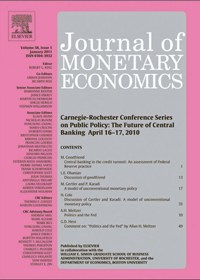
Evans, G., Hommes, C., McGough, B. and Salle, I. (2022). Are long-horizon expectations (de-)stabilizing? Theory and experiments Journal of Monetary Economics, 132:44--63.
-
Affiliated authors
-
Publication year2022
-
JournalJournal of Monetary Economics
The impact of finite forecasting horizons on price dynamics is examined in a standard infinite-horizon asset-pricing model. Our theoretical results link forecasting horizon inversely to expectational feedback, and predict a positive relationship between expectational feedback and various measures of asset-price volatility. We design a laboratory experiment to test these predictions. Consistent with our theory, short-horizon markets are prone to substantial and prolonged deviations from rational expectations, whereas markets with even a modest share of long-horizon forecasters exhibit convergence. Longer-horizon forecasts display more heterogeneity but also prevent coordination on incorrect anchors – a pattern that leads to mispricing in short-horizon markets.